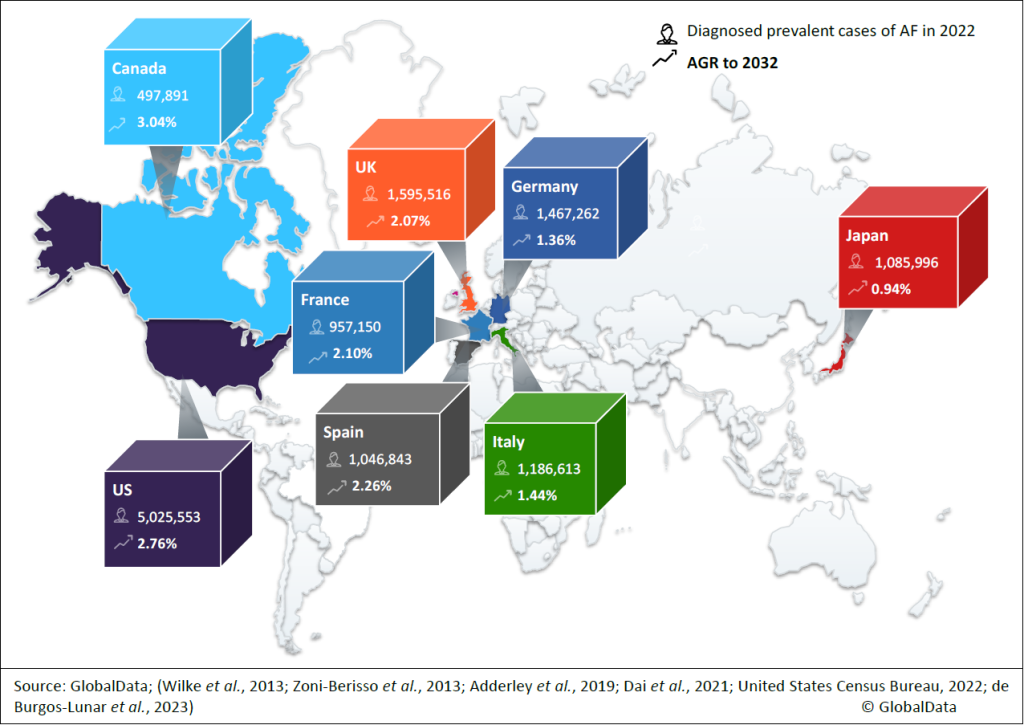
Patients with atrial fibrillation (AF) who have a stroke may benefit from taking anticoagulants earlier than is currently recommended.
This is according to two new studies which suggest that AF patients who take blood-thinning drugs earlier are less likely to have a second stroke and show no increased risk of a brain bleed.

Discover B2B Marketing That Performs
Combine business intelligence and editorial excellence to reach engaged professionals across 36 leading media platforms.
AF means that patients suffer from an irregular heartbeat, which can sometimes result in clots in the heart, which in turn can cause strokes if they reach the brain. AF patients are five times more vulnerable to the risk of strokes for this reason.

According to GlobalData, there were over 14 million total prevalent cases of AF in the eight major markets (8MM: the US, France, Germany, Italy, Spain, the UK, Japan and Canada) in 2022. In its 2023 report, it forecasted that cases would see an AGR of over 2% between 2022 and 2032.
GlobalData is Pharmaceutical Technology‘s parent company.
Of these markets, GlobalData expects Canada to have the highest AGR of 3.04%, which would put the total number of prevalent cases in the country at 712,577 by 2032. US AGR is expected to be second highest, at 2.76% (giving it 5,517,206 prevalent cases by 2023), and Spain will be third, with an AGR of 2.26% and 1,149,257 cases by 2023.

US Tariffs are shifting - will you react or anticipate?
Don’t let policy changes catch you off guard. Stay proactive with real-time data and expert analysis.
By GlobalDataThe report explains: “Any change in the total prevalent cases of AF is attributable to changing population demographics in the 8MM.”
Current advice recommends that AF stroke patients should have to wait up to 14 days before receiving anticoagulants (blood thinners). This is because, on rare occasions, anticoagulants can cause bleeding in the brain.
UK guidelines are varied and depend on the severity of the stroke, but suggest that those who have had a moderate or severe stroke should wait at least five days before starting blood thinning treatments.
However, there has been a lack of research on the impact of early compared to delayed anticoagulant treatment for AF stroke patients. This is what researchers at University College London (UCL) wanted to examine in their study, funded by the British Heart Foundation and published in the Lancet.
Chief investigator David Werring said: “There are concerns that starting anticoagulants too early might increase the risk of bleeding into the area of the brain damaged by the stroke – especially in people with more severe strokes. However, starting them too late might leave the patient at risk of stroke due to further clots from the heart.”
In the study, UCL researchers analysed 3,621 AF patients across 100 hospitals, all of whom had suffered a stroke between 2019 and 2024. Half of the participants began anticoagulant treatment early (meaning within four days of the stroke), and the other half had delayed treatment (between seven and 14 days).
Researchers found that both groups experienced a similar number of recurrent strokes and early treatment was found to be effective. Those who received treatment early did not experience an increased risk of a bleed to the brain.
Of the results, the British Heart Foundation’s chief scientific and medical officer Bryan Williams said: “This important study reveals that taking blood thinning medication within the first few days of a stroke does not come with heightened risk, as previously thought. These results could be transformative, making the case for earlier treatment that could help more people with atrial fibrillation avoid having another stroke, and the associated complications.”




